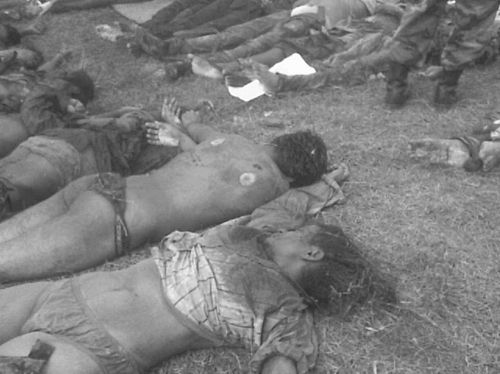 |
| Photograph Salem News |
Next week, the Global Summit to End Sexual Violence in Conflict is due to take place in London, co-hosted by the UK's Foreign Secretary, William Hague and the Special Envoy for the UN High Commissioner for Refugees, Angelina Jolie.
In the run up to the ESVC summit, we revisit the mounting evidence which documents the widespread, systematic and on-going use of sexual violence by Sri Lanka's military against Tamils, that occurs with absolute impunity.
See our full feature: 'Sexual Violence in Conflict: Sri Lanka'
Testimonies collected from victims and from those within the Sri Lankan military suggest sexual violence against Tamils, far from being confined to one rogue detention centre or regiment, was widespread and systematic.
A former UN field officer, present during the final months of the armed conflict, told Human Rights Watch:
“A large number of women fleeing from the conflict areas during the peak of fighting were sexually assaulted. The abuse was extensive, causing a large number of civilians to flee back to the theater of conflict to escape the abuse”Examining 40 cases of sexual violence and torture in detention facilities across the North-East and in Colombo, authors of the 'An Unfinished War: Torture and Sexual Violence in Sri Lanka 2009—2014', which includes Yasmin Sooka, co-author of the UN Panel of Experts report on mass atrocities in Sri Lanka, concluded:
“The similarity of the torture, rape and sexual violence perpetrated against the witnesses confirms a well-organised pattern of systematic abuse on the part of the Government of Sri Lanka security forces.”Many analysts have described a deliberate policy of sexual violence, not only as a means of torture on individuals, but to terrorise the Tamil population as a whole.
Examining the on-going use of sexual violence against Tamils in detention facilities in Sri Lanka since the armed conflict ended, Human Rights Watch, in its report published in February 2013, 'We Will Teach You a Lesson' - Sexual Violence against Tamils by Sri Lankan Security Forces’, said sexual violence was intended “to instill terror in the broader Tamil population”.
The group's UK director, David Mepham, said,
"There is method in this. It is coercive. It is a deliberate policy. People throughout the security forces in Sri Lanka are involved. This is deeply entrenched and systematic."HRW's Asia advocacy directory, John Sifton noted:
“Not only is rape systematic, but it’s indicative of a larger pattern of abuse. This is not reconciliation, but an effort to say, ‘You lost the war, now we’re in charge,”In an interview to VoA, Mr Sifton added,
“The problem is really on a systemic level. Regardless of who committed these specific abuses, a bigger question is, will any high level officials in the Sri Lankan military ever be held accountable for the fact that they allow their forces to engage in abuses as a matter of course, as a systemic issue, and fail to hold them accountable. People who allow an entire military structure to enjoy almost complete impunity in terms of rape, sexual abuse, and other abuses against Tamil civilians, they should be held accountable for that as well, not just for the actual physical acts of soldiers, but for their dereliction of duty and their failures hold their own forces accountable,”
The extent of sexual violence and structural violence inflicted on Tamil women was highlighted by the rights group, Tamils Against Genocide (TAG), in a submission made to the UN Human Rights Council earlier this year – 'Intent to destroy: Ongoing violence and violations against Tamil women'.
The executive summary is reproduced below:
“Women’s bodies have historically been a secondary battlefield in the theater of war, a space where victors claim their spoils and nations plant their flag. In Sri Lanka post-2009, Tamil women’s bodies in the North and East have become both the site of a violent Sinhalisation. process and their only means of survival in a militarized environment. Direct interviews and a compilation of secondary sources reveal that in the period from 2008-2013 women lost their reproductive rights, were forced into coercive sexual relationships or marriages, and faced the constant threat of rape, even as they desperately tried to escape the island. These acts collectively highlight the structural violence that marginalizes Tamil women and subjugates Tamil society. Due to the cultural positioning of Tamil women, these acts go far beyond the immediate physical and psychological damage to the individual woman, they also serve to humiliate Tamil men and reinforce Tamil powerlessness. Violations against Tamil women are a powerful symbolic display of the domination of the Sinhala Buddhist state and majority; they are one of the myriad ways by which the state seeks to destroy the essential foundations of the life of the Tamil people.”See here and here, for reports of coercive birth control in the Tamil areas.
Margaret Owen, the director of Widows for Peace through Democracy, an organisation that is actively involved in launching the British government's conference against sexual violence in conflict next week, said at a panel discussion in the Houses of Parliament last month that the crime was “organised” from the those at the top of the Sri Lankan state.
Highlighting sexual violence in conflict, Ms Owen was nonetheless critical of the continued lack of justice and international inaction:
“We need to end this, holding conferences, yet denying justice for these women,”
“It's not adhoc. These rapes come from the top. It's organised, it is a form of genocide of the Tamil people,”
